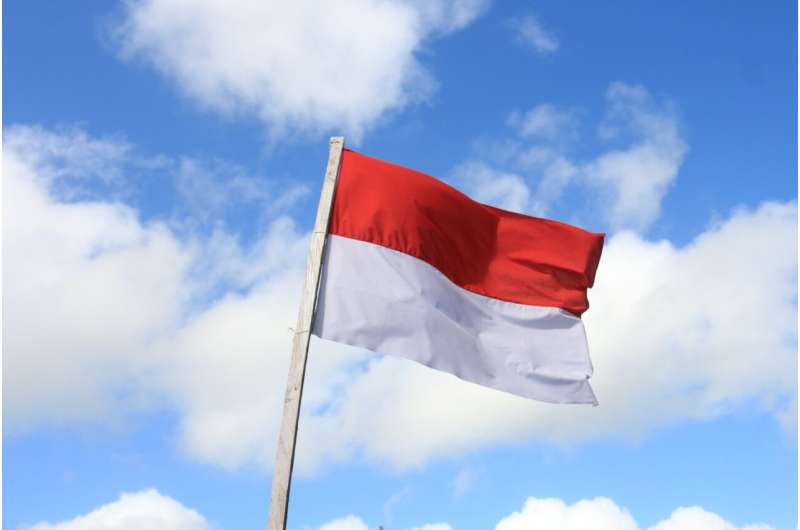The pandemic is a golden opportunity for Papua to step up its game in education technology

Papua, Indonesia's easternmost island and one of its most rural provinces, is significantly behind in education—both in terms of students' learning achievements and digital infrastructure.
The region's and have ranked lowest in Indonesia throughout the last few years. in national examinations among Papuan students also stayed consistent from 2017 to 2019.
In 2020, amid the importance of online learning, Papua had the fewest households with internet access— compared to Jakarta with 89%.
This has meant Papua has during the COVID-19 crisis.
Interestingly, it may just be the right time to invest in Papua's education technology.
Mindset of Papuan educators is shifting
A by the Analytical and Capacity Development Partnership (ACDP)—a collaboration between the Indonesian government, Asian Development Bank (ADB), Australian Aid, and the European Union (EU)—identified at least three essential requirements for developing education technology in Papua.
These include:
- Increasing awareness among educators of the need for technology.
- Ensuring the availability of digital infrastructure.
- Preparing educators so they have the skills to fully implement digital tools.
The first need is the toughest to fulfill—for educators in Papua, and even around the world.
While providing digital infrastructure and training programs is by and large within the Indonesian government's control, it takes a lot of time and effort to shift a mindset.
For instance, revealed that at the time, approximately 70% of teachers in Papua used technology solely for administrative purposes and preparing lessons, not for supporting students' learning—even though the study found many students already owned laptops and smartphones.
In the western world, up until 2019, Massive Open Online Courses (MOOCs) also —despite having some of the biggest academic names providing their courses. This too proved how shifting students' mindset to complete courses online, as they would typically do offline, was no simple task.
Even faced challenges. Despite having been available since the 1960s, classrooms only began to replace chalkboards with whiteboards in the 1990s, as the advent of computers required classrooms to be free of dust.
However, the COVID-19 pandemic has played a significant role in drastically changing behaviors, particularly in education. The closing of schools has pushed Papuan educators to examine their teaching habits and consider the importance of education technology.
Even though the region's , there are indications the use of education technology has soared throughout the region.
According to , the use of education technology (including platforms such as Ruangguru, Zenius, and Google Classroom) in Papua was close to 10%. This is on par with the far more developed provinces like Riau and South Sulawesi. Papua even fared better than some other parts of Sumatra (such as Aceh and Bengkulu), Sulawesi, and Kalimantan.
Amid the pandemic, educators in Papua seem willing to engage in online learning if given an enabling environment.
This is a rare opportunity for stakeholders in Indonesia's education sector—it's the first time in a while Papuan educators are on a level playing field with their peers in the rest of the country.
Multiple opportunities to move forward
The opportunities to seize this momentum exist on various fronts.
In terms of infrastructure, providing general connectivity to the internet lies largely in the government's hands. However, opportunities for providing connectivity to schools, teachers, and students also exist in the form of private funding and public-private partnerships.
Assuming general connectivity remains scarce in Papua, the solution may not even have to be online.
Technology experts and government analysts have previously mentioned a number of alternative tools to online learning, such as the use of —computers the size of credit cards in schools and developing countries—with at least 16 GB memory to carry digital books and learning contents.
The opportunity for private funding is also present in providing . For instance, during the COVID-19 lockdowns, the Ministry of Education and Culture worked with telecommunication companies to give throughout the country.
Furthermore, the ACDP study mentioned to ensure these digital tools are put to proper use. Education experts can assist in developing them in schools and education institutions.
Similarly, schools and regional governments can train educators to use education technology by . There are even programs such as —that push collaboration between different schools and teachers to promote progressive learning practices—to help fill in teaching gaps among educators in the region.
All of these will take a lot of hard work, but they will not be in vain.
Improvement in digital infrastructure and the skills to use them can allow both teachers and students to explore beyond what can be found in schools. An improved monitoring and evaluation system will enhance school leadership, and by extension, lead to better teaching and learning.
There are only two possible outcomes from this pandemic, and they depend on the actions of relevant stakeholders. Papua's education can either attain the support it needs and become competitive, narrowing the gap of the nation's persisting inequalities, or it can receive no support and fall further behind.
Whatever attempts are made, the pandemic is a golden opportunity to leave a lasting and impactful legacy for education in Papua.
Provided by The Conversation
This article is republished from under a Creative Commons license. Read the .![]()




















